Episcopal bishops bring church’s calls for gun reform to congressional visits on Capitol HillPosted Feb 28, 2019 |
|
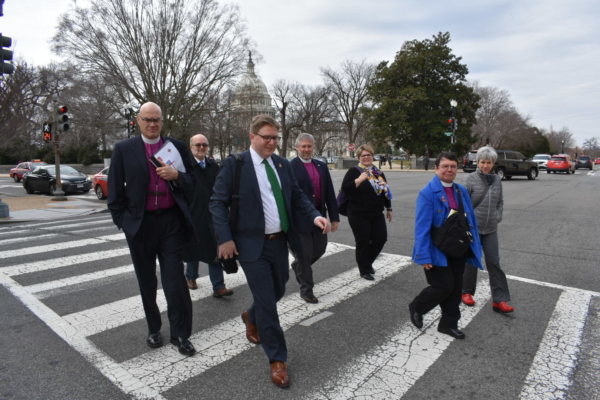
Jack Cobb of the Office of Government Relations leads a group of bishops that include retired Connecticut Bishop Suffragan Jim Curry, Connecticut Bishop Ian Douglas, Central New York Bishop DeDe Duncan-Probe and Washington Assisting Bishop Chilton Knudsen. Photo: David Paulsen/Episcopal News Service
[Episcopal News Service – Washington, D.C.] It was the best of days and the worst of days for eight Episcopal bishops to be on Capitol Hill pressing lawmakers to pass new gun safety measures.
Much of the oxygen in the nation’s capital on Feb. 27 was being sucked up by the daylong testimony of President Donald Trump’s former lawyer, Michael Cohen, his face on TVs all over Capitol Hill as he called his old boss a racist, a conman and a cheat. But beyond the day’s top political story, an unrelated House vote provided a timely backdrop for the bishops’ advocacy.
The bill, known as H.R. 8, would expand background checks for gun purchases, one of the reforms that Bishops United Against Gun Violence points to as a common-sense measure with widespread support, despite the well-funded opposition of gun rights groups like the National Rifle Association.
“Silence on this is complicity,” Connecticut Bishop Ian Douglas told Episcopal News Service during a break in the day’s schedule of meetings with lawmakers and their staffs. “If we’re silent, other people can frame the discourse.”
Bishops United is a network of about 80 Episcopal bishops that formed in the wake of the 2012 massacre of 26 children and educators at Sandy Hook Elementary School in Newtown, Connecticut. Douglas, one of the conveners, still carries with him the memory of that horrific day and its grim aftermath – part of the personal narrative he shares on Capitol Hill to help frame the discourse – though the tragically long list of mass shootings since Sandy Hook supplies the bishops with ample additional examples when calling for legislative action.
The bishops’ day kicked off at 9 a.m. with a closed-door presentation on the pending legislation by Rep. Bobby Scott, a Virginia Democrat, in a conference room at the United Methodist Building across the street from the Capitol.
Rep @BobbyScott to members of Bishops United: Thank you for what you do. It’s important. Thank you for telling us about the people you represent. #BishopsOnTheHill #EpiscopalAdvocacy pic.twitter.com/iaiGA8nqAV
— The Cross Lobby (@TheCrossLobby) February 27, 2019
After Scott left, The Episcopal Church’s Office of Government Relations, which has offices in the building, provided the bishops’ with detailed guidance for an effective day on Capitol Hill. “We want to be here for you, and we want to support the tremendous work that you’re already doing,” said Office of Government Relations Director Rebecca Blachly, whose staff coordinated the congressional meetings and, in most cases, accompanied the bishops from office to office.
Washington Bishop Mariann Budde sat in on the introductory sessions, though she would not be participating in the day’s rounds. She and Douglas were joined by six other bishops. Vermont Bishop Tom Ely had not yet arrived, having scheduled his own Capitol Hill visits with Vermont’s congressional delegation.
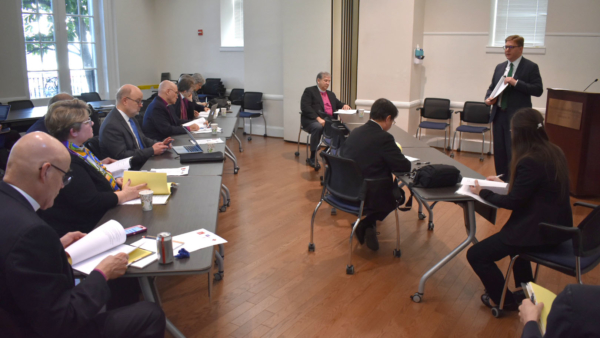
Jack Cobb of the Office of Government Relations coaches the bishops on their upcoming visits with congressional offices during an introductory session Feb. 27 held at the United Methodist Building on Capitol Hill. Photo: David Paulsen/Episcopal News Service
Jack Cobb, who tracks domestic policy issues for the Office of Government Relations, highlighted H.R. 8 but also drew the bishops’ attention to H.R. 1112, which seeks to extend the background check waiting period and close what has been called the “Charleston loophole,” exploited by Dylann Roof to purchase the guns used in the killing of seven people in 2015 at the Emanuel African Methodist Episcopal Church in Charleston, South Carolina.
Cobb noted that legislation is particularly important to Rep. Jim Clyburn, whom the bishops were scheduled to meet with in the afternoon. Clyburn is the House majority whip and a Democrat from South Carolina whose father was a preacher.
The 2015 massacre “could have been his church,” Cobb said. “It’s his backyard, and it’s his bill.”
What else should the bishops know? The lines into congressional office buildings are often long, so arrive early, Cobb said. At the same time, “members of Congress will often be late.” Many of the meetings would be with lawmakers’ staffs, who will take notes and summarize the meeting in memos to be read later by their bosses.
Try to reference any local connections individual bishops have with the lawmakers, Cobb said. Although Long Island Bishop Lawrence Provenzano wasn’t part of these meetings, the bishops should acknowledge Provenzano’s support while meeting with Rep. Peter King, the Long Island Republican, who was a co-sponsor on H.R. 8.
For King and other Republicans who broke with their party to support the legislation, “this is a thank you meeting,” Cobb said. “We want them to know they are supported.”
To cap their meetings, the bishops were encouraged to provide the lawmakers’ offices with printed materials about Bishops United and The Episcopal Church’s positions on gun violence.
Making the rounds on Capitol Hill
The Episcopal Church’s advocacy for stricter regulations dates back more than four decades, with General Convention regularly passing resolutions supporting various gun control measures, most recently a resolution last year calling on the federal government to study gun violence as a public health issue.
A 1976 resolution took a general stance supporting legislation “aimed at controlling the sale and use of hand guns.” A follow-up resolution in 1991 specifically backed the Brady Bill, which was passed and became law in 1993, establishing waiting periods and background checks for handgun purchases.
The Brady Bill and a temporary assault weapons ban in 1994 would be the last significant gun control measures to clear Congress.
H.R. 8 was scheduled Feb. 27 for an afternoon vote and likely approval in the House, where Democrats hold the majority, boosting the spirits of the bishops as they prepared to begin their rounds, though Cobb tempered their optimism.
“In the Senate is where it will have trouble,” Cobb said, explaining that Majority Leader Mitch McConnell had “zero incentive” to put the Senate’s companion bill, 42, on the agenda for debate.
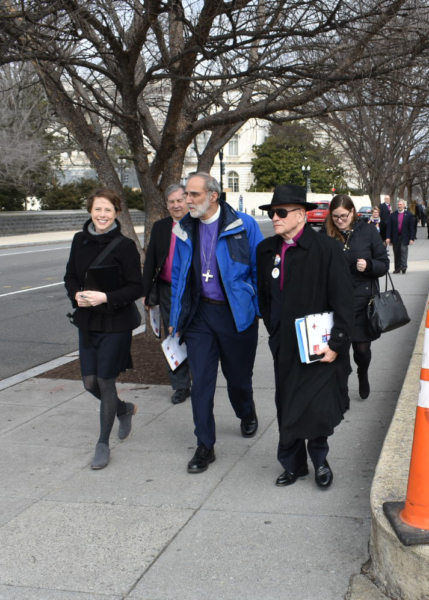
Office of Government Relations Director Rebecca Blachly, left, leads a group of former diocesan bishops: Bishop Joe Doss of New Jersey, Bishop Mark Beckwith of Newark and Bishop Dan Edwards of Nevada. Photo: David Paulsen/Episcopal News Service
After a brief prayer by Douglas, the bishops split into two groups and headed to their respective appointments. Blachly, walking past the Supreme Court toward the House office buildings, led a group that included three former diocesan bishops, Bishop Mark Beckwith of Newark, Bishop Joe Doss of New Jersey and Bishop Dan Edwards of Nevada. Cobb headed in the opposite direction to the Russell Senate Office Building followed by Douglas, Central New York Bishop DeDe Duncan-Probe, retired Bishop Suffragan Jim Curry of Connecticut and Bishop Chilton Knudsen, mere days into her new role as assisting bishop in the Diocese of Washington.
ENS was not granted access inside any of the meetings at lawmakers’ offices but was able to follow Cobb’s group and interview the bishops throughout the morning as they traveled around Capitol Hill, stopping at three Senate offices.
Duncan-Probe admitted early on that she had not expected to take the lead in any of the day’s meetings, given that she is one of the newer members of Bishops United, but she accepted that lead role during her group’s first stop, at the offices of New York Sen. Kirsten Gillibrand, a Democrat who also is running for president.
Their meeting was scheduled for 10:45 a.m., but Gillibrand’s representatives were running late because of a meeting at the Capitol. They arrived at 11:13 a.m. and ushered the bishops down the hall and into a meeting room, where Duncan-Probe prepared to kick things off.
The door closed. Time from greeting to end of meeting: 21 minutes.
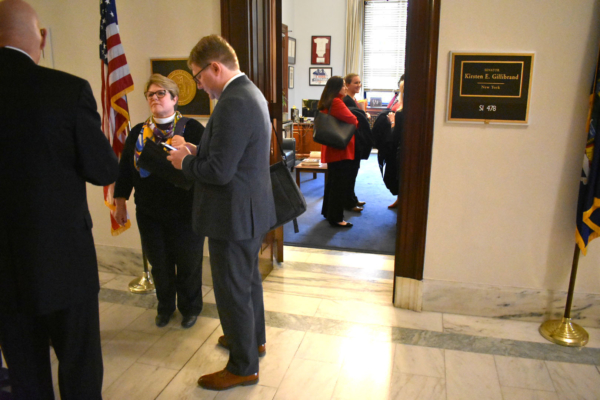
Central New York Bishop DeDe Duncan-Probe prepares to lead her group’s discussion Feb. 27 with staff members of New York Sen. Kirsten Gillibrand’s office. Photo: David Paulsen/Episcopal News Service
“Excellent job,” Curry said to Duncan-Probe afterward, as the group shuffled along to their next appointment.
“I was talking fast because I was nervous,” Duncan-Probe said, but also because she wanted to thoroughly summarize the bishops’ position. “I was trying to figure out the sound bite I wanted her to take back to Kirsten. … We’re a voting bloc.”
Duncan-Probe elaborated later that her diocese is “struggling with the diversity of this issue.” Episcopalians in Central New York include hunters, military veterans and others who are comfortable around guns, as well as liberal-minded Episcopalians who may never have even held a gun, much less shot one.
“Across the diocese there’s a commitment to having a safe society and a just society,” Duncan-Probe said, even if individuals don’t always agree on the particular approaches.
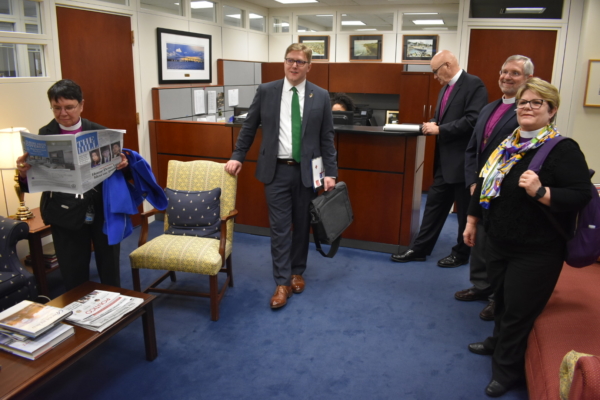
Jack Cobb and the bishops watch the Michael Cohen testimony on TV as they wait for their next meeting Feb. 27 in the office of Sen. Sheldon Whitehouse, D-R.I. Photo: David Paulsen/Episcopal News Service
Cobb led the group to a basement corridor so they could pass underground into the Hart Senate Office Building.
“Our other meeting has” – he looked at his watch – “started. So we need to keep moving.”
The bishops had hoped to meet in person with Sen. Sheldon Whitehouse, a Democrat from Rhode Island and a fellow Episcopalian, but he was tied up in a committee meeting. As Cobb’s group waited in Whitehouse’s office, they glanced at a TV that was tuned to CNN and the Cohen hearing.
At 11:42 a.m., Whitehouse’s legal counsel Ches Garrison arrived and invited the bishops into a meeting room. Curry took the lead this time. Afterward, they all posed for a group photo.
Meeting duration: 31 minutes.
“We’re dealing with allies,” Curry told ENS on the way out. Trying to persuade a senator or representative to change a “no” vote to a “yes” is important, but Curry said it also is necessary to support those already fighting for reform. “We weren’t saying anything new, and yet we’re received with a sense of gratitude, that we are doing this work.”
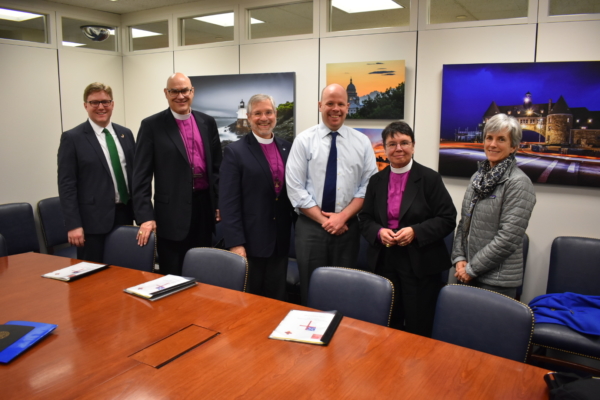
The Bishops United group poses for a photo with Ches Garrison, legal counsel for Sen. Sheldon Whitehouse, after their meeting Feb. 27. From left are Jack Cobb of the Office of Government Relations, retired Connecticut Bishop Suffragan Jim Curry, Connecticut Bishop Ian Douglas, Garrison, Washington Assisting Bishop Chilton Knudsen and Douglas’ wife, Kristin Harris. Photo: David Paulsen/Episcopal News Service
Bishops embrace anti-violence mission, impossible to ignore
Their last stop before lunch was the office of Sen. Chris Murphy, a Democrat from Connecticut.
“Oh, great. Time for me to go to work,” Douglas said. He took the lead when a woman with Murphy’s staff greeted them and led them to a meeting room.
As they met, the Cohen testimony continued on the TV near the office’s entrance, this one tuned to MSNBC. Nearby, a map of Connecticut features tiny pins placed across the state, put there by the many people who have come to visit the senator’s office. Four individuals entered the office and placed an additional pin on Sandy Hook. They were from Newtown Action Alliance and had come for their own meeting.
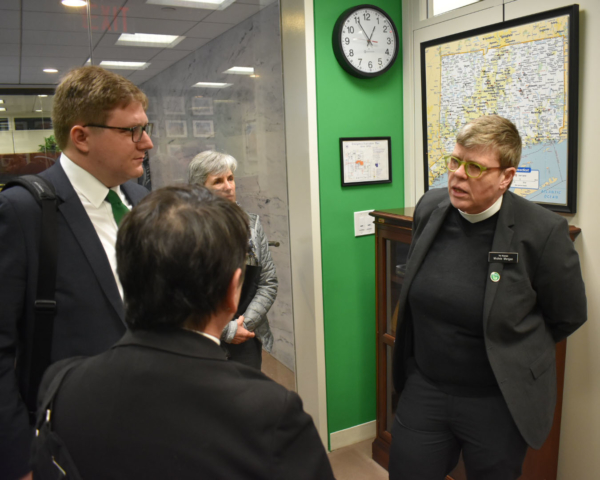
The Bishops United group chats Feb. 27 with the Rev. Michele Morgan, rector of St. Mark’s Episcopal Church on Capitol Hill, who was visiting Sen. Chris Murphy’s office as part of a group from Newtown Action Alliance. Photo: David Paulsen/Episcopal News Service
When the bishops wrapped up – 24 minutes – they greeted the Newtown group like old friends. One of them was the Rev. Michele Morgan, of St. Mark’s Episcopal Church on Capitol Hill, who is active on gun violence issues in Washington. Another was Eric Milgram, whose daughter was a first-grader at Sandy Hook at the time of the massacre and survived.
“Are you pounding the pavement?” Newtown Action Alliance Chairwoman Po Murray asked.
“Oh, yeah,” Douglas replied.
At lunch back at the United Methodist Building, Douglas told ENS he always begins conversations on these issues by saying he never intended it to be part of his agenda when he became bishop, but it became unavoidable after Dec. 12, 2012. St. John’s Episcopal Church next to Sandy Hook Elementary School became a site for community grieving after the massacre, and on a more personal level, Douglas felt the impact of the rampage directly during a service for Ben Wheeler, one of the young victims whose family attended Trinity Episcopal Church in Newtown.
“I made a commitment to his parents, that this would be part of my vocation and my ministry as long as I’m bishop,” Douglas said.
He thinks Murphy feels the same, but in the role of a lawmaker instead of a religious leader. Murphy was the congressman representing Newtown at the time of the shooting, and now as senator, he is the lead sponsor of the Senate bill seeking to expand background checks.
After lunch, most of the bishops left for the Capitol to meet with Clyburn, the majority whip. Ely, after sharing a meal with his fellow bishops, parted ways to see his home-state senator, Patrick Leahy, a Democrat. But when Ely arrived in Leahy’s office, the office TV was tuned not to the Cohen hearing but to Leahy’s floor speech in the Senate on climate change. Was Leahy unavailable to meet in person?
Moments later, Leahy senior adviser Kevin McDonald arrived and reassured Ely that the senator was waiting to meet the bishop over in the Capitol. “This is [Leahy’s] biggest meeting of the day,” McDonald said.
Meanwhile, as the House debated the background check bill, Douglas and Knudsen made their way to the lawn on the east side of the Capitol, where celebratory gatherings were planned for the bill’s expected passage. The Newtown Action Alliance representatives met them there.
Bishops United would spend much of Feb. 28 meeting with Newtown Action Alliance and other partners in the fight against gun violence as the bishops plot the network’s future path. Their week culminates March 1 with a noon prayer service that will be streamed live on Facebook.
On Feb. 27, news broke around 4 p.m. that H.R. 8 cleared the House by a vote of 240-190, and lawmakers began pouring out of the Capitol for photo-ops, some in front of the Capitol’s steps and others on the lawn. House Speaker Nancy Pelosi joined a crowd of bill supporters and posed for photos with them standing next to Rep. Lucy McBath, a freshman Democrat from Georgia whose son was shot and killed in 2012. (The House would pass Clyburn’s “Charleston loophole” bill the next day.)
Douglas, Knudsen and the group from Newtown Action Alliance gravitated to a nearby spot on the Capitol steps where members of the Connecticut congressional delegation, including Murphy, had gathered to herald the House vote.
.@ctbishopian speaks with his state’s senators @SenBlumenthal and @ChrisMurphyCT in the wake of the House passing #HR8 on universal background checks. #BishopsOnTheHill #EpiscopalAdvocacy pic.twitter.com/ViCHlItxOx
— The Cross Lobby (@TheCrossLobby) February 27, 2019
Murphy vowed to work toward passage in the Senate as well, while acknowledging that progress on gun reform has long been an uphill battle.
“This is an advertisement for why elections matter,” the senator said. “This is an advertisement for why persistent political action matters. Big social change doesn’t happen overnight. You hit obstacles. You fail before you succeed.”
– David Paulsen is an editor and reporter for the Episcopal News Service. He can be reached at dpaulsen@episcopalchurch.org.

Social Menu